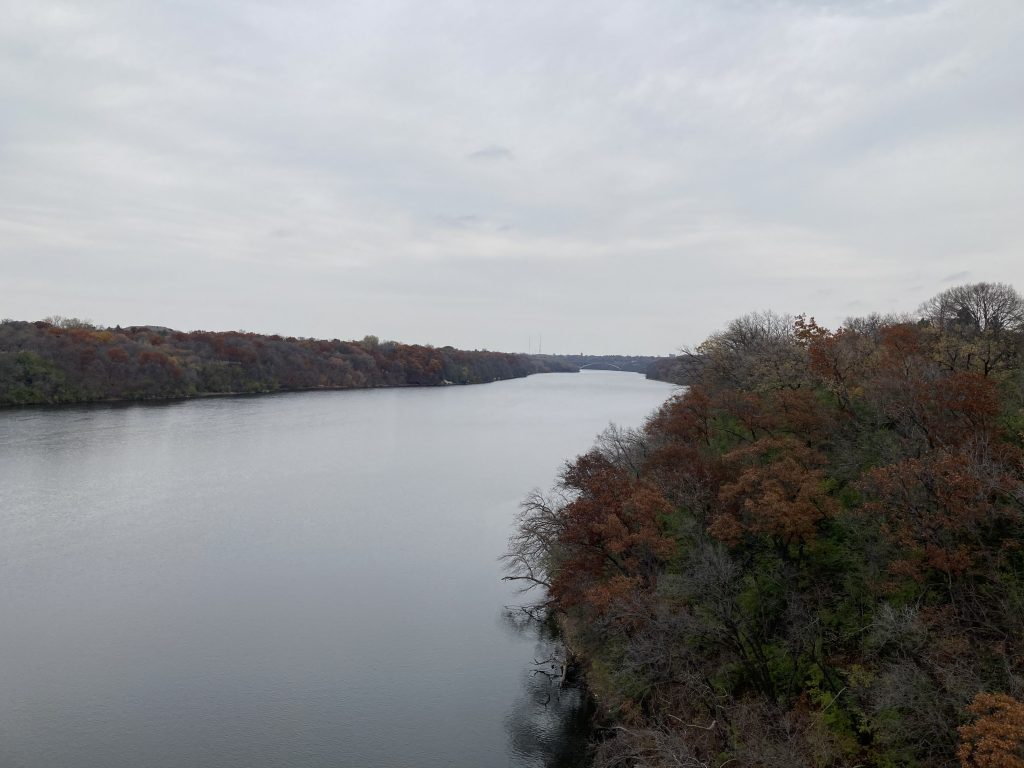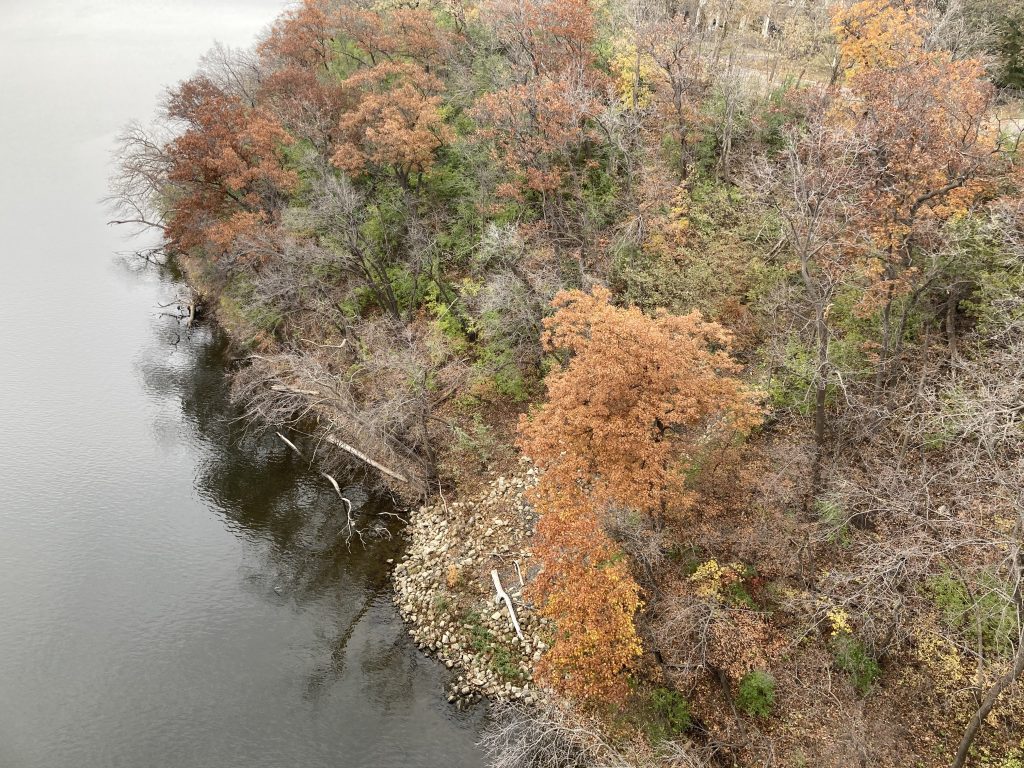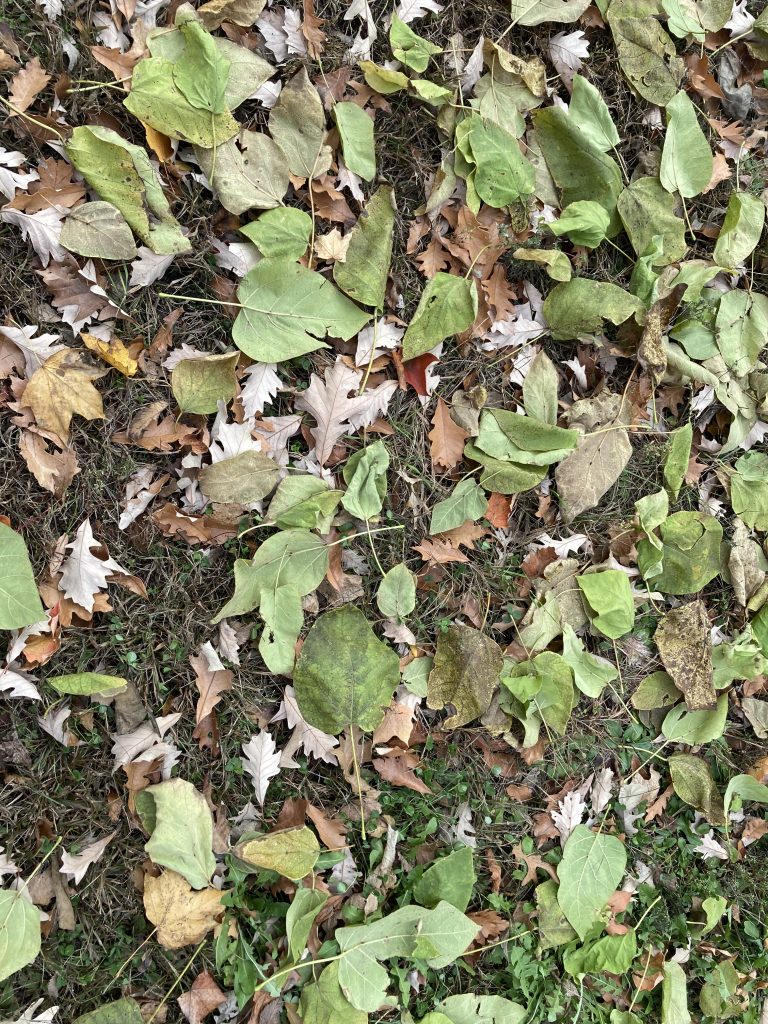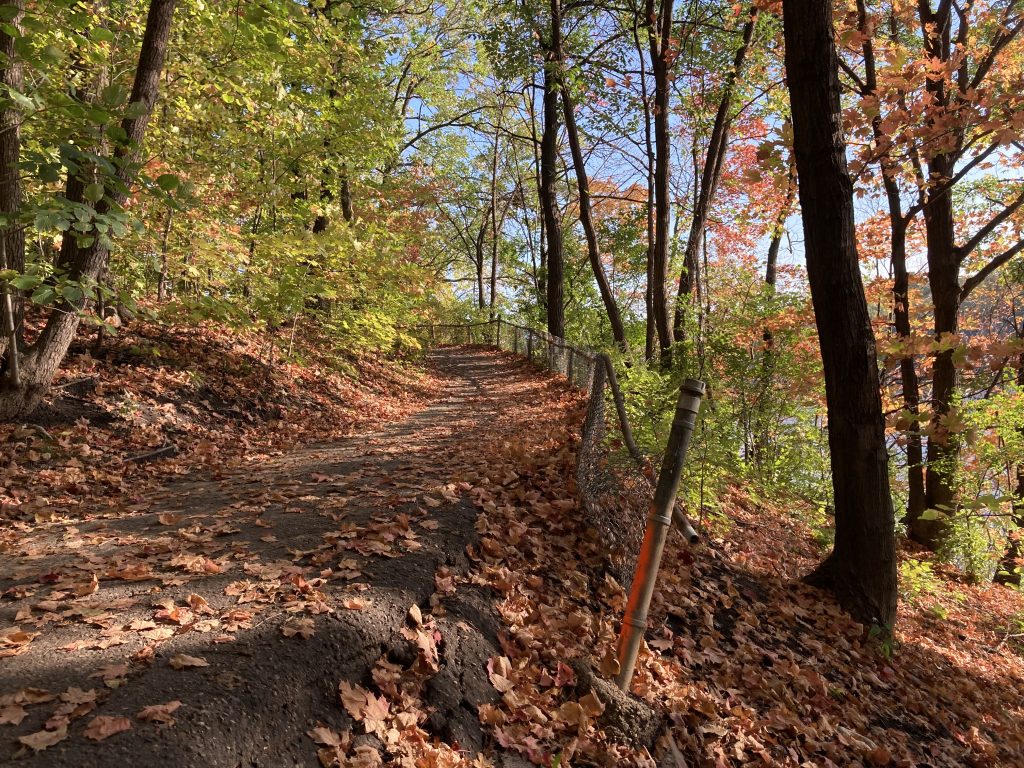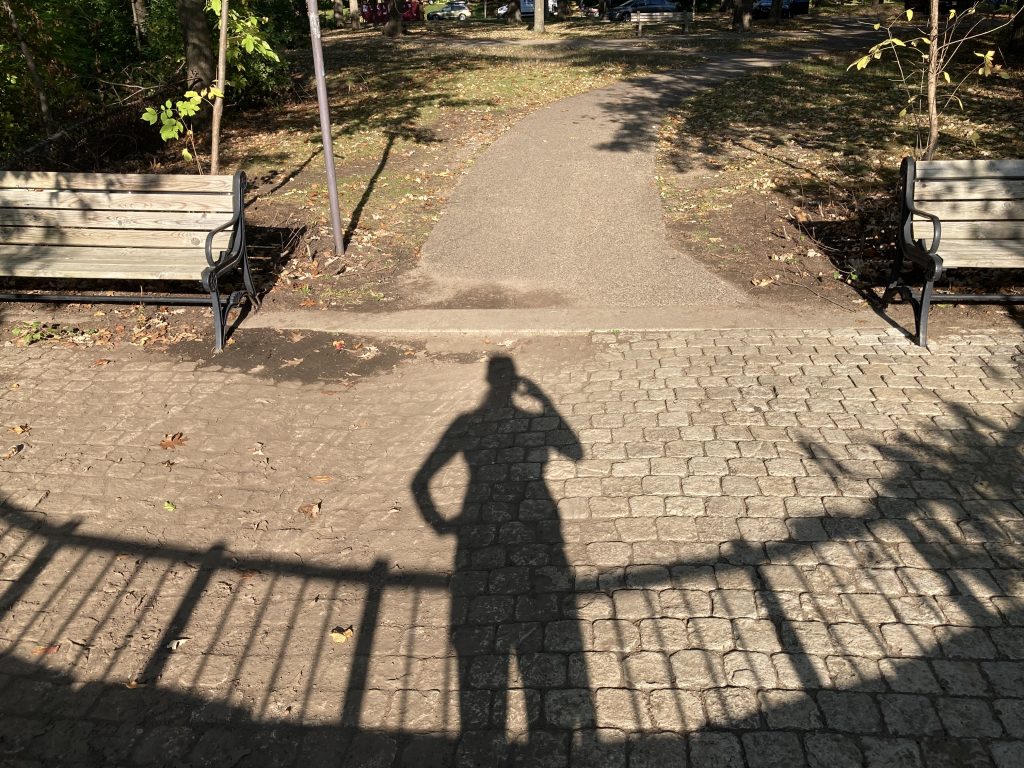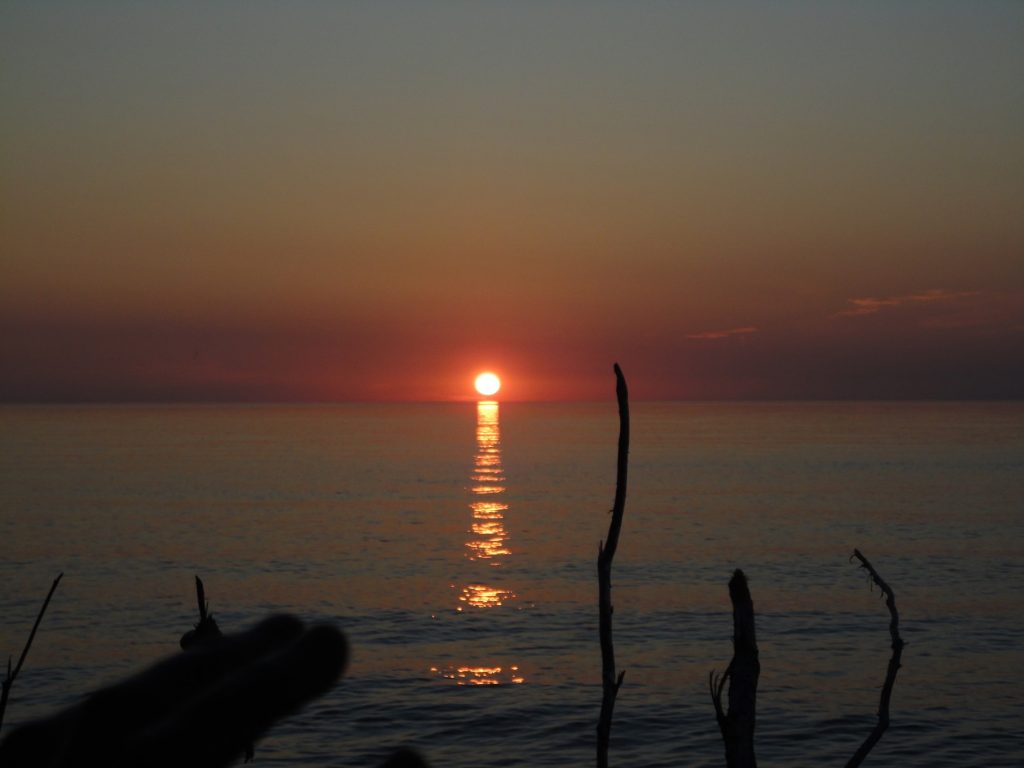5 miles
veterans’ home loop
42 degrees
What a day! Sunny and calm and beautiful. I overdressed — didn’t need the gloves or the headband, maybe should’ve worn a lighter sweatshirt? Ran south to the falls, over the creek, behind John Steven’s house, over the creek again, to the grounds of the Veterans’ home, down the hill to the locks and dam no. 1, north on the river road, past the welcoming oaks, down through the tunnel of trees, across to Edmund, then done. Ran 5 miles without stopping. I didn’t even stop while taking off my sweatshirt and wrapping it around my waist. It would have been smart to stop for that, but I wanted to keep moving, so I did, and probably looked ridiculous.
10 Things
- chirp chirp chirp
- my ponytail swishing and hitting my shoulder
- my shadow — sharp and straight and solid
- a group of people — was it kids and a teacher, or all adults? I’m not sure — standng silently on the grass between Minnehaha Academy and Becketwood
- shimmering scattering glowing river water
- rushing gushing falls
- the fake bells from the light rail sounding like the beginning of an ABBA song (at least to me) — I thought about listening to an ABBA playlist on my run back, but I forgot
- running over the bridge that leads to the Veterans’ home, hearing the creek rushing way below me
- encountering a few walkers — a short woman, later a tall man — as I ran down the steep hill to locks and dam no. 1
- 4 stones stacked on the ancient boulder
As I ran down a hill into Minnehaha Park, I tried to remember the sun and the warmth and the bare ground, and thought about how this same path will be cold and snow-covered within a month.
Before my run, I thought about how before works in my Haunts poem and revisited a wonderful poem, “Transubstantiation,” that plays with befores and afters. I wanted to explore the idea of after while I ran — what comes before, what after? But I realized as I moved that I am most interested in playing around with the before, creating layers of befores that don’t follow a linear progression, but circle around unresolved. I held onto as many of my thought as I can, then recorded them into my phone once my run was done.
transcript: November 13, 2023. Just finished a 5 mile run and while I was running I was thinking about girl ghost and gorge and befores and how I’m not interested in doing afters, I’m interested in circling around these befores. Not in a linear way, but a circular way. I’ll do another one that is before there was gorge, there was girl. That one will be about me before I started paying attention, before I started running by the gorge, before this practice. Then there will be one that’s before there was girl, there was ghost. This one will involve more of my mom as a ghost. I’m interested in playing around with the befores and making it disorienting; there’s no real origin point. It’s circular and repeats itself, phrases repeat themselves.
repetition: chiasmus and chanting
Thinking more about the circularity of my befores and the chant-like repetition of girl ghost gorge / ghost girl gorge / gorge ghost girl. Before my run, during my morning ritual of coffee and poetry, I encountered Jane Huffman’s poem, “The Rest” and her discussion/explanation of it in, “Backwashes and Eddies: Jane Huffman on “The Rest”“. She mentions the chiasmus, which I had to look up to remember what it meant:
Repetition of any group of verse elements (including rhyme and grammatical structure) in reverse order, such as the rhyme scheme ABBA. Examples can be found in Biblical scripture (“But many that are first / Shall be last, / And many that are last / Shall be first”; Matthew 19:30). See also John Keats’s “Ode on a Grecian Urn” (“Beauty is truth, truth beauty”).
glossary term, Poetry Foundation
Here’s how Huffman describes her use of it in “The Rest”:
Cut red / flowers hung in pink water.
Cut pink flowers hung in red water.
Cut red water hung in pink flowers.
Cut pink water hung in red flowers.The poem operates in reversals, in mirror images, in symmetries: “Cut [pink or red] [flowers or water] hung in [pink or red] [flowers or water].”
About the water and flowers, Huffman also says this:
Indeed, “The Rest” refuses to move on. It cannot. It is obsessive, recalibrating the relationship between “flowers” and “water” until its options are exhausted. Exhaustion is a teleology of sickness. One cough anticipates the next.
“The Rest” is about her frequent bouts with bronchitis and Huffman uses repetion, especially the chiasmus, for several reasons:
- the bilateral symmetry of her lungs — inhale/exhale left lung/right lung
- stagnation / the stasis of the bedridden body / back and forth / refusing to move on (the backwashes and eddies)
- seeks to capture the banality of the body — daily routine
- imperfect — not exactly the same, repetition with variation
poetic forms that use repetition in this way: villanelle, ghazal, duplex, pantoum
Huffman argues that her repetition of the flowers and the water give the poem its emotional thrust. I’m not sure what I want to do with these ideas, but I can feel them informing my choices about how to use repetition in this poem. One idea: maybe my 3/2 form could involve inverted repetition at some points?
Now moving on to chants, after a quick search, I found this essay: Learning the Chant Poem.
repetition: for meaning, memory, magic, music
to only repeat is boring
the best chant poems are expansive
repetition is important, but so is chaos/wildness
One key: it’s okay to use some nonsense words
an hour, or so, later: I’m returning to this entry because I want to make note of how Huffman’s poem has influenced/inspired me. In particular, I was thinking about her formula and the variations she created to play with the repetition, unsettling it and giving it movement and an emotional punch:
Cut [pink or red] [flowers or water] hung in [pink or red] [flowers or water].
After a few minutes of playing around with the ideas, my own formula emerged:
Before [girl, ghost, or gorge], [girl, ghost, or gorge]: or .
[2 beat word — concise and expansive].
Here’s one that I came up with the I’ll put right before the section of the poem about wanting to run with my mom:
Before girl, ghost.
Cancer.
Terminal.
Before ghost, girl:
intact.
Ooo, I like this! I hope it’s an idea that sticks.
